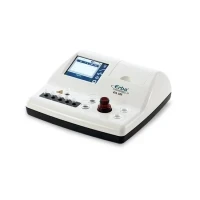
ECL 105 Analyzer Machine
The ECL 105 Analyzer is a clinical chemistry analyzer used for performing a variety of diagnostic tests in medical laboratories. Here is a detailed overview of its features, functionalities, and applications:
Key Features:
1. Performance and Throughput:
- High Throughput: Designed to handle a large number of tests per hour, making it suitable for medium to high-volume laboratories.
- Quick Turnaround: Provides fast results, which enhances the efficiency of laboratory operations and allows for prompt patient diagnosis.
2. Test Menu:
- Versatile Assays: Supports a wide range of assays, including routine tests such as glucose, cholesterol, electrolytes, and liver enzymes. It can also perform specialized tests based on laboratory needs.
- Customizable Panels: Allows for the configuration of test panels tailored to specific diagnostic requirements.
3. Automation and Efficiency:
- Automated Operations: Features automation for sample handling, reagent management, and calibration, reducing manual workload and minimizing errors.
- Integrated Quality Control: Includes automated quality control procedures to ensure accurate and reliable test results.
4. Sample Types:
- Multiple Samples: Capable of processing various sample types including serum, plasma, and urine, providing flexibility in sample analysis.
5. User Interface:
- Touchscreen Display: Equipped with an intuitive touchscreen interface for easy navigation and operation.
- Software Integration: User-friendly software supports straightforward data entry, result interpretation, and system management.
6. Connectivity and Data Management:
- LIS Integration: Can be connected to Laboratory Information Systems (LIS) for efficient data management and integration into the laboratory’s workflow.
- Data Handling: Offers comprehensive data storage, retrieval, and report generation features.
7. Design and Ergonomics:
- Compact Footprint: Designed to fit in various laboratory environments, including those with space constraints.
- Ergonomic Design: Focuses on user convenience and efficient operation.
Applications
- Routine Clinical Testing: Ideal for conducting a broad range of clinical chemistry assays used in routine diagnostics and health monitoring.
- Specialized Diagnostics: Can be configured for specialized testing based on specific diagnostic needs of the laboratory.
Considerations
- Training: Proper training is essential for laboratory personnel to effectively operate the analyzer and accurately interpret results.
- Maintenance: Regular maintenance and calibration are necessary to maintain the analyzer’s performance and accuracy. Adhere to the manufacturer’s guidelines for upkeep.
- Technical Support: Manufacturer support is available for troubleshooting, service, and operational assistance. Ensure you have access to this support as needed.
